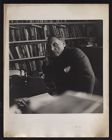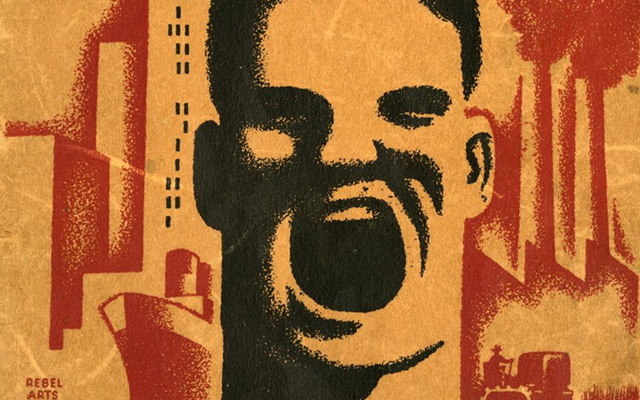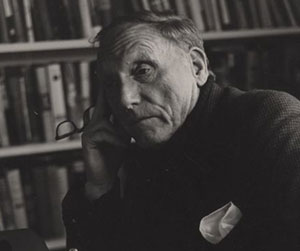Robert Penn Warren
Access to this item is restricted. To see this item, login with a valid ECU PirateID or visit J.Y. Joyner Library at East Carolina University. Contact Digital Collections if you have questions about this restriction.
ECU PirateID Login
- Title
- Robert Penn Warren
- Description
- Black and white photograph of Robert Penn Warren. Date approximated.
- Date
- 1960-1965
- Original Format
- photographs
- Extent
- 27cm x 35cm
- Local Identifier
- 1169-014-b017-fzzo-ios1
- Subject(s)
- Location of Original
- East Carolina Manuscript Collection
- Rights
-
This item is restricted for campus-use only. It has been made available for research, teaching, and private study. Researchers are responsible for using these materials in accordance with Title 17 of the United States Code and any other applicable statutes. If you are the creator or copyright holder of this item and would like it removed, please contact us at als_digitalcollections@ecu.edu.
http://rightsstatements.org/vocab/InC-EDU/1.0/ - Permalink
- https://digital.lib.ecu.edu/21649
- Preferred Citation
- Cite this item
- This item
-
 Robert Penn Warren
Robert Penn Warren
- My Collections Login
- Printable Feedback Form
- Found in theme/project
-
 Special Collections Staff Picks
Special Collections Staff Picks
-
 Stuart Wright
Stuart Wright
- Location of Original
- Stuart Wright Collection: Robert Penn Warren Papers from the East Carolina Manuscript Collection
- View all digitized items from the Stuart Wright Collection: Robert Penn Warren Papers
Public access is provided to these resources to preserve the historical record. The content represents the opinions and actions of their creators and the culture in which they were produced. Therefore, some materials may contain language and imagery that is outdated, offensive and/or harmful. The content does not reflect the opinions, values, or beliefs of ECU Libraries.
Contact Digital Collections
If you know something about this item or would like to request additional information, click here.
Comments
Comment on This Item
Complete the fields below to post a public comment about the material featured on this page. The email address you submit will not be displayed and would only be used to contact you with additional questions or comments.
Few could hope to have such an accomplished life as Robert Penn Warren. Three time Pulitzer Prize winner and the first Poet Laureate of the US, Warren’s prolific and versatile career includes ten novels, a collection of short stories, and numerous poems, dramas, and literary criticisms. He is also one of the most influential of the New Critics, a group that evaluated literary work by close reading and valued highly polished, difficult works characteristic of the Modernist period. Warren was taught by fellow Stuart Wright Collection author John Crowe Ransom.<br><br>Among several typescripts, manuscripts, and personal correspondence, the Stuart Wright Collection boasts more than 40 poems and over 60 pieces of literary criticism by Warren, many of which are unpublished or include revisions to original text in the poet’s own hand. This work of literary criticism preserves Warren’s remarkable views on literature. One such essay, titled “Fiction: Why Do We Read It?” shows the passion and importance he invested in fiction. On page 5, Warren quotes Freud’s assertion that the “’meagre satisfactions’ that man ‘can extract from reality leave him starving.’” What then can slate our hunger? According to Warren, it is fiction. On the same page, Warren asserts that:<br><br>In it we find, in imagination, not only the pleasure of recognizing our past, but the pleasure of experimenting with experiences which we deeply, and perhaps unwittingly, crave but which the limitations of life, the fear of consequences, or the severity of our principles forbid to us.<br><br>Thus, it is Warren’s belief that the act of reading fiction is not an escape from reality, but rather an escape to fiction (p2).<br><br>This is not the only role of fiction, however. Throughout “Fiction, Why Do We Read It?” Warren compares fiction to a daydream accessible to multiple individuals. It is this accessibility that makes fiction a social experiment of sorts. Warren explicates this concept on page 7:<br><br>To enter the publicly available day dream you have to surrender something of your own identity, have to let it be absorbed. You must identify yourself with somebody else, and accept his fate. You must take a role.<br><br>A reader may wonder at this point what value there is in surrendering a piece of their identity. After all, it is a piece of us, it is us in a sense. To sacrifice any bit of identity seems to compromise our sense of self. Warren doesn’t think so, however; in fact, he believes the opposite:<br><br>Play, when we are children, and fiction, when we are grownup, lead us, through role-taking, to a knowledge of others. But role-taking leads us, by the same token, to a knowledge of ourselves, really to the creation of the self. (9)<br><br>What Warren is saying is that to understand ourselves, we must have something to compare ourselves to, much like the relationship between light and darkness or hot and cold. Our concept of self, however, stems from within, not from perceptive senses like sight or touch. In order to make a comparison of who we are and who others are, we must take the role of someone else. At this point we can start to make statements such as “I’m not as brave as Aragorn” or “I could never fall in love with a vampire.” Comparisons such as these allow us to understand what we are and what we are not as individuals.<br><br>One would think, with the importance Warren grants fiction, that he would be an enthusiast of education in fiction writing.. In fact, Warren was adamant that fiction should not be taught in a university. On the second page of a literary essay titled “Courses in Writing,” Warren states:<br><br>It [the university] should realize that writing, except as a craft [technical and trade writing], is not to be taught – that the ideal is to create some semblance, however modest, of the natural community in which writing is learned by process of trial and error, of self-exploration of form.<br><br>Warren believes that fiction comes about from experimentation and peer review, not instruction. To instruct someone on how to compose fiction is to deny fiction its intrinsic value, supplementing it with popular styles and format in an effort to make a piece successful. To the new critics, nothing could be more villainous.<br><br>For more information on the New Critics, try the summary given here.<br> http://public.wsu.edu/~delahoyd/new.crit.html <br>For more insight into the mind of poet, author, and ersatz philosopher Robert Penn Warren, request one of his boxes from the Stuart Wright Collection and head to the third floor of Joyner library to enjoy.